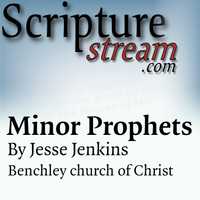-
Zechariah 8:1-14:21
-
Zechariah was mentioned in Ezra 5:1; 6:14 and possibly also Matthew 23:35.
-
Zechariah 8:1-15 – God would again bless them.
-
Zechariah 8:16-17 – God’s blessings would be conditional. Their fast days would become feasts of joy.
-
Zechariah 9:1-17 – God pronounces judgment on the Gentile nations, but a remnant of even these would return to God – clearly a Messianic prophecy.
-
Zechariah 10:2 – Idols are false and can never give blessings.
-
Zechariah 11 – Allegory of the good and foolish shepherds.
-
Zechariah 11:7 – The good shepherd made two staffs: Favor and Union.
-
Zechariah 11:11 – The staff (covenant) was broken.
-
Zechariah 11:13 – Prophecy of Judas Iscariot and his betrayal.
-
Zechariah 11:14 – Union was broken, signifying the breaking of the brotherhood between Judah and Israel.
-
Zechariah 11:15-17 – The foolish shepherd would not care for the flock. Hebrews 13:17
-
-
Zechariah 12 – Jerusalem defeats the nations because God fights for her.
- Zechariah 12:7 – Allusion to Judah receiving the gospel first.
-
Zechariah 13-14 – The Messiah: the kingship and church.
-
Zechariah 13:1 – Fountain = Christ’s blood.
-
Zechariah 13:2-3 – There would be no more prophets.
-
Zechariah 13:7 – The shepherd would be smitten. Matthew 26:31
-
Zechariah 14:3 – God is with us in our battles.
-
Zechariah 14:8 – This might be implying that Jesus’ blood cleanses those in the Old and New Covenants.
-
Zechariah 14:17-18 – All people must come to the new Jerusalem (the church) to serve God.
-
-
Lessons for us:
-
God’s people must walk in His name to be His people.
-
Jesus’ blood is for all in all time.
-
Woe to foolish shepherds.
-
Jesus is now king.
-
Prophets and unclean spirits are gone.
-
All preaching must have a “thus sayeth the Lord.”
-
All must come to new Jerusalem (the church).
-
Good shepherds care for God’s flock.
-
God won’t bless those who don’t serve Him.
-
JJ
January 27, 2021
For further study, see also:
Questions or comments? Join our Discord server for further study.
